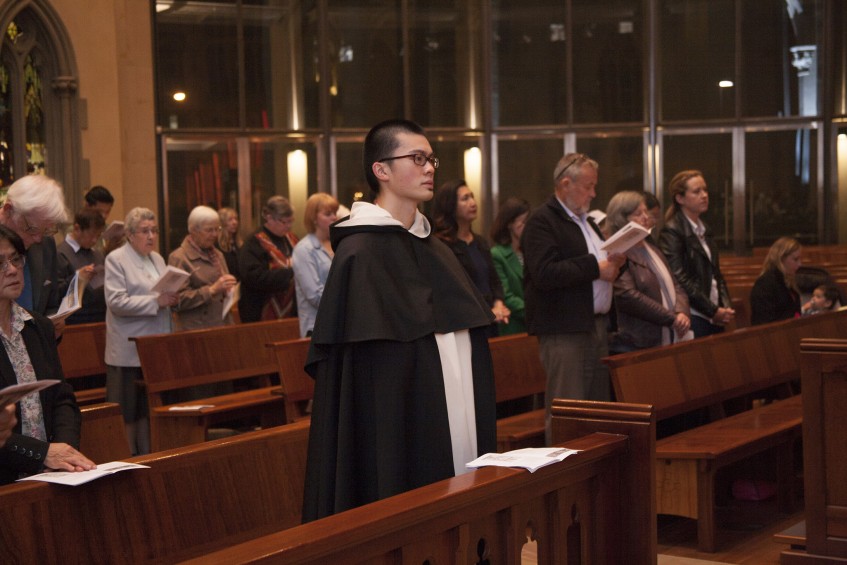Br Reginald drawn to preaching the endless beauty of Christianity

Br Reginald recently marked the end of his novitiate of Dominican formation by taking the step of “simple profession” at St Mary’s Cathedral in Perth at the end of last month. PHOTO: Jamie O’Brien
By Marco Ceccarelli and Mark Reidy
Twenty-three-year-old Brother Reginald Mary, formerly David Chua, is living proof that the Archdiocese of Perth is gradually contributing to the preparation of future leadership for the Catholic Church in Australia.
A former resident in the suburb of Willetton, Perth, Br Reginald recently marked the end of his novitiate of Dominican formation by taking the step of “simple profession” in Perth at the end of last month.
“The profession felt like the most natural thing in the world,” he said.
“At the moment, I feel this is where God has called me to be. I am so happy because I feel that this is the life that can best fulfill me as a person and as a Christian who wants to preach and witness to Christ.
“All the wonderful elements in the Dominican way of life appeal to me, particularly the community of brothers and the possibility to reach out to students in the universities where so much of the work of Dominicans is aimed.”
Br Reginald, who was studying for a Master of Philosophy at Sydney University prior to entering, was initially drawn to the Order through the witness of the Dominican priests at the university.
“When I discovered that there was a Dominican apostolate at Sydney University, I met the priests and noticed that their lives were centred around a contemplative search for truth in Christ, the scriptures, the word of God, contemplation and sharing all this with the people they encountered in their ministry.
“That was a moment in which I came to realise that this could be the fulfilment of my desires of evangelising.”
Another element that drew Br Reginald to the Dominicans was the Catholic intellectual tradition that they have maintained since the founding of their order.
The Dominicans are famed for having cultivated an interest for theology and philosophy from the Middle Ages until this day, something that Br Reginald holds in high regard and which he believes will be useful in his ministry.
His views on the potential for philosophy and theology to be used as tools of evangelisation make a convincing case for the validity of Christianity in our modern world.
“One thing that enriched my faith was being exposed to the richness of the Catholic intellectual tradition - and not just Thomas Aquinas and the Popes - but also the Western philosophical tradition which in some ways has been drawn into the Church, such as the works of Plato and Aristotle.
“These were the philosophers whom theologians like St Thomas, St Bonaventure and St John Paul II drew on to make the rational case for the beauty found in the truth of Christianity.
“That is the only answer to someone who is asking that question: could it be that Christianity is irrational? The answer is ‘no’, and it is ‘no’ not just because you need to have faith – which is of course an essential element of being Christian - but it is ‘no’ because your intellect can actually tell you this.
“You still need to take a leap of faith, but it is important to know that the leap of faith you’re taking isn’t irrational. That is the lie put forward by secular philosophy. That’s the real competing worldview in the 21st century, the new evangelisation has to direct itself against this opposing view.”
His comments on the current challenges faced by Christianity highlight the importance of his work, and the work of religious brothers, sisters and priests, in a contemporary setting.
“A new kind of dominant worldview has emerged, often spoken about by Benedict XVI, which views Christianity as irrational precisely because it involves this leap of faith. It’s not to say that we don’t need faith, but that faith itself is not opposed in such a way to reason or to anything in the human person,” Br Reginald said.
Br Reginald has now entered the studendate, a more limited community where friars in formation find the space to consolidate the values they have acquired, in which he will undertake formal philosophical and theological studies in preparation for his priestly ordination.
